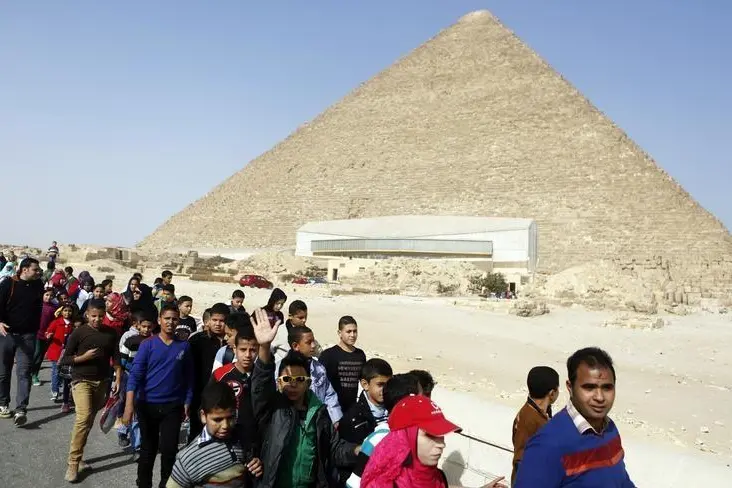PHOTO
The Eid Al-Fitr holiday has given Egyptian tourism a much-needed boost, reports Ahmed Kotb
Despite security concerns as a result of the terrorist attacks that have taken place over recent weeks, Egyptians and non-Egyptians have been packing their bags and seeking Egypt's resorts to escape the summer heat, giving a much-needed boost to the country's tourism industry.
The Eid Al-Fitr holiday, a three-day celebration that follows the holy month of Ramadan, started last Friday this year and saw booming domestic travel to Egypt's coastal cities, with hotel occupancy rates reaching 93 per cent in Sharm El-Sheikh, 90 per cent in Hurghada, 95 per cent in Ain Al-Sokhna and Ras Sedr, and 91 per cent in Alexandria, the North Coast and Marsa Matrouh, according to statistics published by the ministry of tourism.
Since hotels were posting less than 50 per cent occupancy rates before the holiday, the surge in tourist numbers has been attributed mainly to domestic tourists, as the number of Egyptians who travel to internal attractions increases exponentially during the holidays.
Khaled Rami, the minister of tourism, said in a press release last week that domestic tourism was like a "safety valve" for many tourist destinations in Egypt, especially during times of crisis. The minister was referring to the modest foreign tourist inflows since the 25 January Revolution in 2011, which has caused suffering to many Egyptian tourism facilities.
According to Sami Mahmoud, head of the Egyptian Tourism Authority (ETA), more than 60 per cent of hotel guests during the Eid Al-Fitr holiday were Egyptians. Most of them were visiting beach resorts as part of trips organised by government and public-sector institutions, in addition to normal reservations via tourism companies, he said.
"Domestic tourism during the Eid Al-Fitr holiday compensated to a certain extent for the decline in foreign bookings," Mahmoud stated.
Cultural tourism also attracted more visitors during the holiday. More than 40,000 Egyptian and foreign tourists visited the Giza Pyramids throughout the three-day holiday, according to the Middle East News Agency (MENA). Approximately 37,000 Egyptians and over 3,000 foreigners visited the ancient site.
Despite cheap prices and promotions, hotels in Luxor and Aswan remained nearly empty, however, with occupancy rates of just 10 per cent and mainly due to the extremely hot weather in the two destinations during the summer.
However, the Ministry of Tourism has launched the third phase of its "Egypt in our Hearts" initiative which provides discounted prices on flights within Egypt, as well as tour packages and Nile cruises, under the title "Luxor and Aswan in our Hearts" in order to encourage domestic travel. The first two phases of the initiative started in late 2014 and were extended until the end of last month. The current phase is expected to end on 30 September.
But domestic tourism cannot compensate for the lack of foreign tourists, according to experts. "Domestic tourism accounts for nearly $2 billion in revenues on a yearly basis, while revenues from foreign tourism exceed $10 billion," said Elhami Al-Zayat, head of the Egyptian Travel Agents Association. While domestic tourism helps give the sector a boost during seasons like Eid Al-Fitr, he added, the industry needs more Arab and foreign tourists.
Mahmoud pointed to successful efforts in attracting more Arab tourists this year, these "demonstrating their belief in Egypt's ability to secure its tourist destinations." He said there had been a 23 per cent increase in the number of Arab visitors to Egypt in May, compared to the same month last year.
The overall number of visitors to Egypt increased in May by 16.5 per cent, and the number from January to May jumped by 16.5 per cent, compared to the same period in 2014.
A campaign was launched in May by ETA under the title "Egypt is Close" designed to target Arab tourists expected to come to Egypt throughout the second half of 2015. "We are in the middle of the summer season, the favourite time of year for Arabs enjoying their vacations in Egypt," Mahmoud said.
Terrorism continues to challenge the tourism sector in Egypt. The assassination of Egypt's chief prosecutor, Hisham Barakat, last month, as well as other terrorist attacks has led to a number of governments issuing travel warnings against Egypt. However, Mahmoud said the overall number of tourists was on the rise because of awareness of the safety of tourist sites.
Media outlets should be clear about differentiating between North and South Sinai when they cover events like terrorist attacks in the peninsula, Mahmoud stressed, adding that tourist destinations, especially the Red Sea resorts of Sharm El-Sheikh and Hurghada in South Sinai, were very safe and far from areas that have seen clashes between Egypt's military and terrorists in the North.
Egypt's efforts to revive its tourism industry have continued with a global promotional campaign valued at $136 million to be spent over three years. Seven companies have bid to take charge of the campaign, and the winner will be named next month.
Egypt's Minister of Tourism was quoted by media outlets in May as saying that the country was expecting 11.5 to 12 million tourists during 2015, with expected total revenues of $9 to $9.5 billion. In 2014, 9.9 million tourists visited Egypt, bringing about $7.5 billion with them.
These numbers are getting closer to the figures for 2010, the best year for the industry with a registered 14.7 million tourists and $12.5 billion in revenues.
© Al Ahram Weekly 2015





















